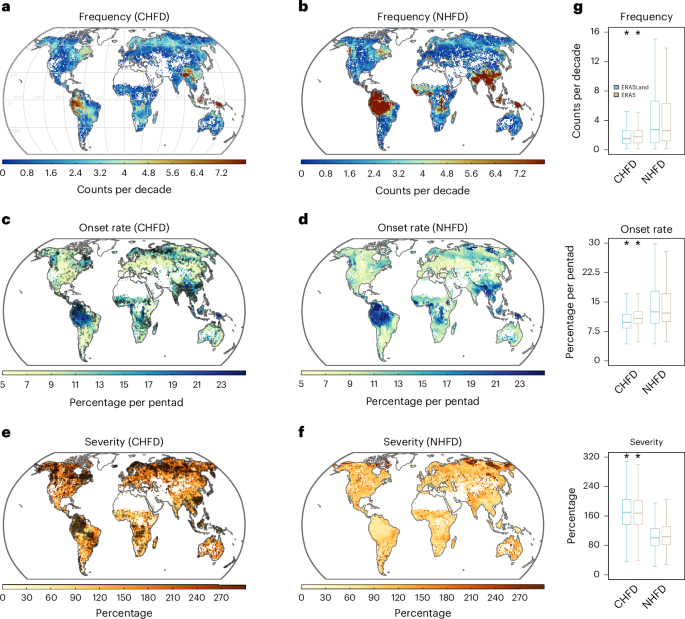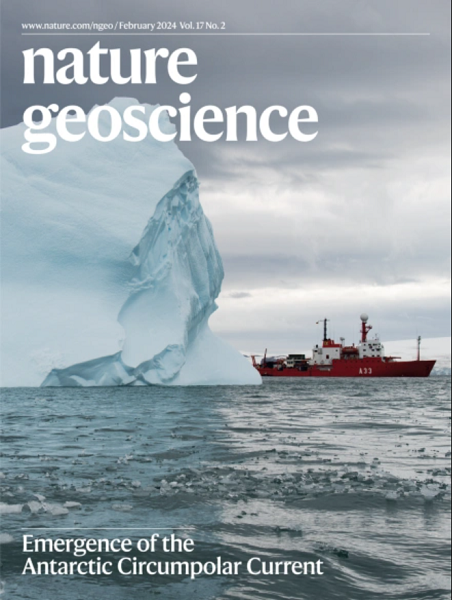Flash drought impacts on global ecosystems amplified by extreme heat
IF 16.1
1区 地球科学
Q1 GEOSCIENCES, MULTIDISCIPLINARY
引用次数: 0
Abstract
Flash droughts—characterized by their rapid onset—can cause devastating socioeconomic and agricultural damage. During such events, soil moisture depletion is driven not only by precipitation shortages but also by the elevated atmospheric moisture demand arising due to extreme heat. However, the role of extreme heat in shaping the evolution of flash droughts and their ecological impacts remains uncertain. Here we investigate the processes involved by analysing global reanalysis data from 1950 to 2022. We find that, when flash droughts are accompanied by extreme heat, they exhibit 6.7–90.8% higher severity and 8.3–114.3% longer recovery time than flash droughts without extreme heat. The presence of extreme heat during flash droughts accelerates soil moisture drawdown over high latitudes, where wet soils and enhanced radiation foster evapotranspiration. By contrast, it slows the absolute onset speed in subtropical transitional climate zones owing to evapotranspiration throttling. Our machine learning approach further reveals that hot flash droughts lead to sharper declines in ecosystem productivity, particularly in croplands, thereby threatening global food security. These findings underscore the pressing need for enhanced infrastructure and ecosystem resilience to hot flash droughts in a warming future. Flash droughts that are accompanied by extreme heat drive more severe and prolonged impacts on global ecosystems, according to analysis of global reanalysis data and satellite observations.


极端高温加剧了突发性干旱对全球生态系统的影响
突发性干旱的特点是发生迅速,可造成毁灭性的社会经济和农业损失。在此类事件中,土壤水分耗竭不仅受到降水短缺的驱动,还受到极端高温引起的大气水分需求增加的驱动。然而,极端高温在形成突发性干旱演变及其生态影响中的作用仍不确定。在这里,我们通过分析1950年至2022年的全球再分析数据来研究所涉及的过程。结果表明,与无极端高温条件下的突发性干旱相比,极端高温条件下突发性干旱的严重程度高6.7 ~ 90.8%,恢复时间长8.3 ~ 114.3%。在突发性干旱期间,极端高温的存在加速了高纬度地区土壤水分的下降,在那里,潮湿的土壤和增强的辐射促进了蒸散作用。而在亚热带过渡气候区,由于蒸散发的抑制作用,其绝对启动速度减慢。我们的机器学习方法进一步揭示,热浪干旱导致生态系统生产力急剧下降,尤其是农田,从而威胁到全球粮食安全。这些发现强调了在变暖的未来,加强基础设施和生态系统抵御暴发性干旱的能力的迫切需要。
本文章由计算机程序翻译,如有差异,请以英文原文为准。
求助全文
约1分钟内获得全文
求助全文
来源期刊

Nature Geoscience
地学-地球科学综合
CiteScore
26.70
自引率
1.60%
发文量
187
审稿时长
3.3 months
期刊介绍:
Nature Geoscience is a monthly interdisciplinary journal that gathers top-tier research spanning Earth Sciences and related fields.
The journal covers all geoscience disciplines, including fieldwork, modeling, and theoretical studies.
Topics include atmospheric science, biogeochemistry, climate science, geobiology, geochemistry, geoinformatics, remote sensing, geology, geomagnetism, paleomagnetism, geomorphology, geophysics, glaciology, hydrology, limnology, mineralogy, oceanography, paleontology, paleoclimatology, paleoceanography, petrology, planetary science, seismology, space physics, tectonics, and volcanology.
Nature Geoscience upholds its commitment to publishing significant, high-quality Earth Sciences research through fair, rapid, and rigorous peer review, overseen by a team of full-time professional editors.
 求助内容:
求助内容: 应助结果提醒方式:
应助结果提醒方式:


